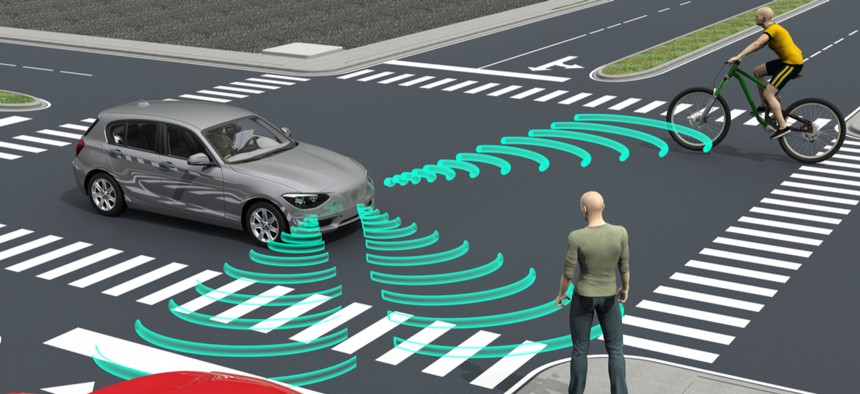A Checklist for Congress and the President in a Divided America

posteriori/Shutterstock.com
There are technologies waiting to be tapped as forces for good.
President Trump delivered the State of the Union address earlier this month—just days after the divisive impeachment process—and spoke to a bitterly divided nation.
But those among us longing for a more united America have a reason to be hopeful. For all our disagreements, some policies can be enacted that most Americans—no matter their feelings about the president, Congress or “the other side”—can support.
Having recently returned from CES® 2020 in Las Vegas, I’ve seen people from all over the world unite around technology as a force for good with great optimism for the decade ahead. If innovation can bring together people from different nationalities, backgrounds and identities year after year at CES, it also can help forge a path to greater consensus in the future.
With that in mind, here are what Congress and the president should prioritize to help make this upcoming decade stronger, safer and more secure for our country and us as Americans:
Self-driving vehicles. Cars are a core part of our American identity but they’re also one of the deadliest aspects of modern life. Over 36,500 people died on the road in 2018, and 94% of all traffic accidents are caused by human error.
We’ve already seen the transformative impact technology has on our roads. Technologies, forged on the way to self-driving cars, including automatic braking, rearview cameras and lane-departure warnings, can decrease crashes by 78%. Self-driving vehicles are the next step toward a future where car accidents are a thing of the past.
But we need a coordinated effort between the public and private sectors—state and federal officials, the Department of Transportation and the auto and tech industries—to get the job done. By prioritizing this groundbreaking technology, our leaders can boost the economy, deliver undreamed-of independence to people with disabilities and save thousands of American lives a year.
Privacy. We all know there’s plenty of information about us out there on the internet—from our saved online banking information to online vehicle registration to avoid a trip to the Department of Motor Vehicles. The big question for many of us is—who controls that information? And what are they permitted to do with it?
As the world becomes more connected through data, questions around digital privacy arise. We must avoid a patchwork effect that doesn’t work when data flows not just across state borders, but across international borders in a matter of milliseconds. By creating a flexible, clear framework that outlines what corporations can and cannot do with personal data, we can keep our entrepreneurs and innovators creating global-leading companies and empower consumers to use the businesses that best meet their needs.
Interoperability requirements. From our smartphones to our smart homes, devices must be able to talk together to facilitate better exchanges across platforms and devices. We need standards to enable a far more seamless exchange of information that would facilitate better consumer access to health, financial, and other information individuals use to manage their lives—whether that’s on a smartphone, wearable or sensor. Truly interoperable systems increase productivity and reduce costs. Without standards established by the industry in partnership with government, we will never realize the full potential of technology to continue to transform the way we live.
Spectrum. We are on the cusp of a revolution in connectivity. Soon we’ll be able to blanket entire communities and cities with the benefits of 5G—a platform for life-changing innovations from digital health to virtual reality—taking us to new heights of productivity and sustainability. We'll be able to better connect with our doctors, care for our older family members and understand our own wellness through telehealth solutions, and speed delivery services through drones.
To bring these benefits to life, we’ll need more unlicensed spectrum. The more airwaves available to transmit information, the greater our efficiency and productivity will be. The Federal Communications Commission recently made 3.5GHz spectrum available for unlicensed use—a helpful move, but one that must be followed up on. For example, the FCC is looking into making 6GHz spectrum available to enable unlicensed innovations. This is key if we want to win the global race to 5G.
U.S.-U.K. trade deal. Last month, the United Kingdom formally exited from the European Union. As the U.K. grapples with its independence from the EU, we can—and should—take this opportunity to carve out a trade deal.
Our two countries’ shared language, commitment to individual liberty and pioneering spirit of innovation make us ideal partners for the upcoming decade. But not all countries support these values of democracy and freedom. By working together—and crafting a trade deal to support both U.S. and U.K. innovators—our two nations can achieve far more together in our mutual goals.
It’s easy to despair about U.S. politics, and the upcoming election cycle has the potential to deepen our divides. But it doesn’t have to be this way. All Americans want a better life for our children and a stronger future for our nation. Innovation carries that promise.
By putting our partisanship aside and working toward these realistic bipartisan goals, we can realize that promise together.
Gary Shapiro is president and CEO of the Consumer Technology Association (CTA)®, the U.S. trade association representing more than 2,000 consumer technology companies, and a New York Times best-selling author. He is the author of the new book, Ninja Future: Secrets to Success in the New World of Innovation. His views are his own.






